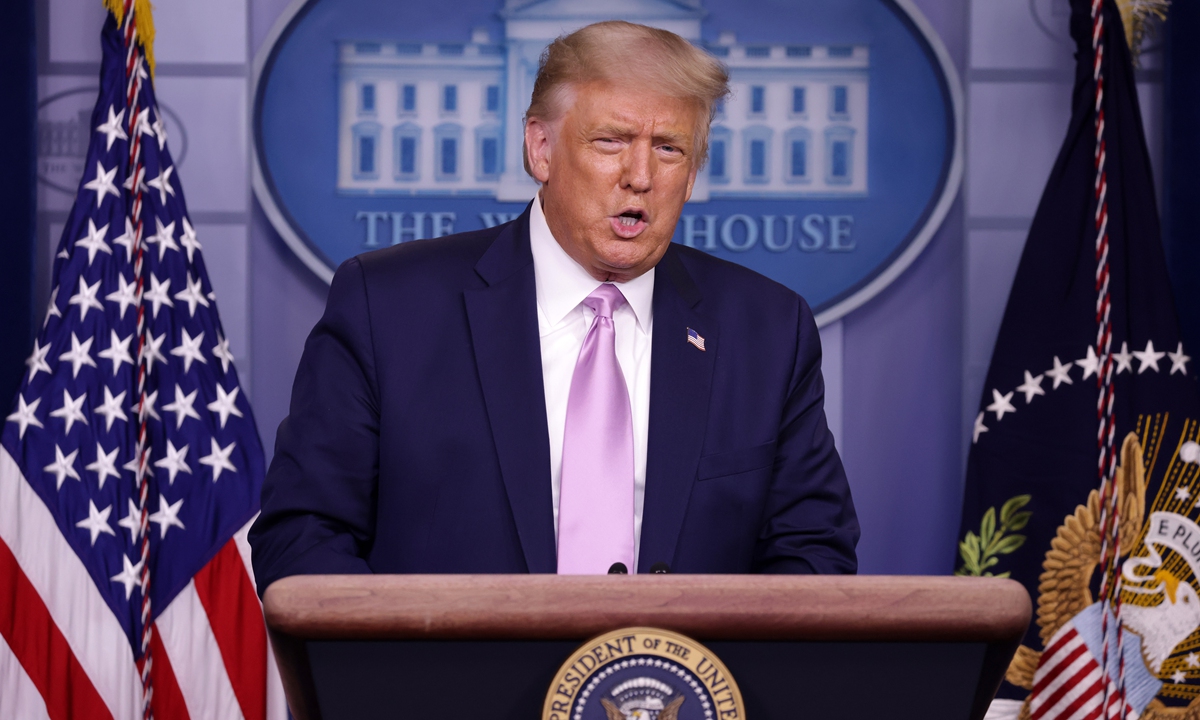US election degenerates to being tough on China: Global Times editorial
Source: Global Times Published: 2020/8/12 22:13:40

U.S. President Donald Trump speaks during a news conference in the James Brady Press Briefing Room of the White House on Tuesday in Washington, DC. Photo: AFP
The US elections are drawing near, and the China agenda has been heating up. US President Donald Trump said on Tuesday that once Joe Biden wins, the Americans "are going to have to learn to speak Chinese." The Democrats are showing an even harder stance toward China, mocking Trump who praised China several times for doing a good job in the coronavirus fight. Racing on which side is tougher on China has become a prominent show before the US elections.This is nasty. A US election which focuses on criticizing China is vixen culture. The highest political debate takes no manner and rules of international politics into consideration, while disrespect and offenses are considered a show of pride. This is degradation.
The Chinese people will not feel angry, but think it is weird and nasty. They find that the top of US politics is shallow. The debate between the two political parties is full of cursing, and when it comes to the affairs of other countries, the debate becomes outrageous. The cultural superiority of the US is used rudely here.
We'd like to ask the two parties to quarrel in a civilized manner and not to pin China, although we know this is useless. The two parties view winning the election as their highest interest, and US national interests are put aside, let alone the interests of humanity. Neither side is willing to sacrifice even one percent of its election interests for the sake of the public interest.
This adds difficulties to how the Chinese people understand the US government's real attitude toward China. Which of the harsh words on China will turn into Washington's actual policy, and which are just election rhetoric to attract voters?
What is true is that the anti-China spectacle in this election will become the US' new opinion mobilization to worsen ties with China. Many Chinese scholars who study the US have warned that although Washington's tone toward China may shift back to some degree after the election, the harm is irreversible and the trajectory of the worsening China-US ties will not be reversed.
The US "democratic system" is far from rational and binding as we have believed. The extent to which bilateral relations deviate from the normal track cannot cope with the reality of exchanges between the two. Washington's attitude toward China is not like what it should be toward one of its biggest trading partners. Right before the outbreak of the coronavirus outbreak, dozens of flights went between China and the US every day, and millions of people from the two countries flew to each other every year. The Chinese students are the largest group of foreign students in the US. The number of Hollywood movies being screened in China is much more than in other countries. Nonetheless, Washington now talks about China like how they talked about the Soviet Union decades ago.
US-style democracy provides an opportunity to extreme thoughts, and legitimizes the capriciousness and risk-taking in top-level politics. Strategic trials that might change the world are much less costly in the US than people imagine.
Before election day, the two parties in the US will trade accusations about China. It is hard for China to stay silent. But Beijing will fall into the trap if it responds too much.
We suggest that China stop guessing what Washington really means by its statements. No matter what the US is up to, as long as it doesn't damage our interests, we should attach less attention to or simply ignore them. But if our interests and diplomatic dignity are infringed, we should spare no countermeasures.
In the face of the increasingly uncertain US, the most profound policy of China should be accelerating its development and construction of vital capabilities. Whoever takes office, Washington's strategic malice toward Beijing won't decline. China must depend on itself to defend its own interests, rather than hope that Washington will change its mind.
Posted in: EDITORIAL